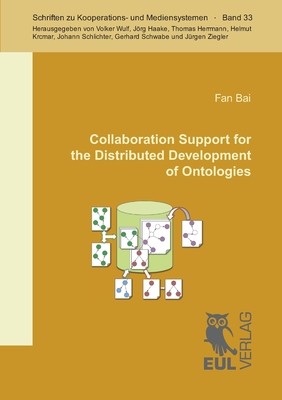
- We will send in 10–14 business days.
- Author: Fan Bai
- Publisher: Josef Eul Verlag GmbH
- Year: 2013
- Pages: 142
- ISBN-10: 3844102280
- ISBN-13: 9783844102284
- Format: 14.8 x 21 x 0.8 cm, minkšti viršeliai
- Language: English
- SAVE -10% with code: EXTRA
Collaboration Support for the Distributed Development of Ontologies (e-book) (used book) | bookbook.eu
Reviews
Description
The development of ontologies which aims at capturing knowledge as a formal structural framework, is an important foundation for a wide range of applications. Since ontology development is usually a collaborative activity which may span a long period of time, it is critical to provide developers with a suitable development environment that supports collaboration in a flexible manner and that facilitates the building of robust and accurate ontologies. In this dissertation, the author focusses his effort on providing an easy-to-use collaborative ontology development environment that supports both synchronous and asynchronous collaborative activities. Two prototype systems were developed to reach the goal based on an extensive requirement study. The first prototype system servers numerous functions in supporting synchronized cooperation. A Java based application provides developers with several functions. For example, with the help of group-awareness and a locking mechanism, involved developers become aware of actions from other users, which enables them to work without conflict in terms of editing the same ontology resources. Based on the experiences gathered from implementing the first prototype system, the requirement of supporting asynchronous cooperation was studied. A version control system especially in the fields of coping with ontology data structure is a central component to satisfy the requirement. This second approach primarily supports local workspaces that can be synchronized with a central server-based ontology store and is capable of controlling versions on the level of individual ontology resources. Although working in their own workspace ontology developers can achieve a consensual shared ontology through committing, updating and merging activities. Each version of an ontology resource will be preserved in the form of a snapshot. The evolution of either a single ontology resource or the entire ontology can further be illustrated to developers in a
EXTRA 10 % discount with code: EXTRA
The promotion ends in 21d.22:17:52
The discount code is valid when purchasing from 10 €. Discounts do not stack.
- Author: Fan Bai
- Publisher: Josef Eul Verlag GmbH
- Year: 2013
- Pages: 142
- ISBN-10: 3844102280
- ISBN-13: 9783844102284
- Format: 14.8 x 21 x 0.8 cm, minkšti viršeliai
- Language: English English
The development of ontologies which aims at capturing knowledge as a formal structural framework, is an important foundation for a wide range of applications. Since ontology development is usually a collaborative activity which may span a long period of time, it is critical to provide developers with a suitable development environment that supports collaboration in a flexible manner and that facilitates the building of robust and accurate ontologies. In this dissertation, the author focusses his effort on providing an easy-to-use collaborative ontology development environment that supports both synchronous and asynchronous collaborative activities. Two prototype systems were developed to reach the goal based on an extensive requirement study. The first prototype system servers numerous functions in supporting synchronized cooperation. A Java based application provides developers with several functions. For example, with the help of group-awareness and a locking mechanism, involved developers become aware of actions from other users, which enables them to work without conflict in terms of editing the same ontology resources. Based on the experiences gathered from implementing the first prototype system, the requirement of supporting asynchronous cooperation was studied. A version control system especially in the fields of coping with ontology data structure is a central component to satisfy the requirement. This second approach primarily supports local workspaces that can be synchronized with a central server-based ontology store and is capable of controlling versions on the level of individual ontology resources. Although working in their own workspace ontology developers can achieve a consensual shared ontology through committing, updating and merging activities. Each version of an ontology resource will be preserved in the form of a snapshot. The evolution of either a single ontology resource or the entire ontology can further be illustrated to developers in a


Reviews